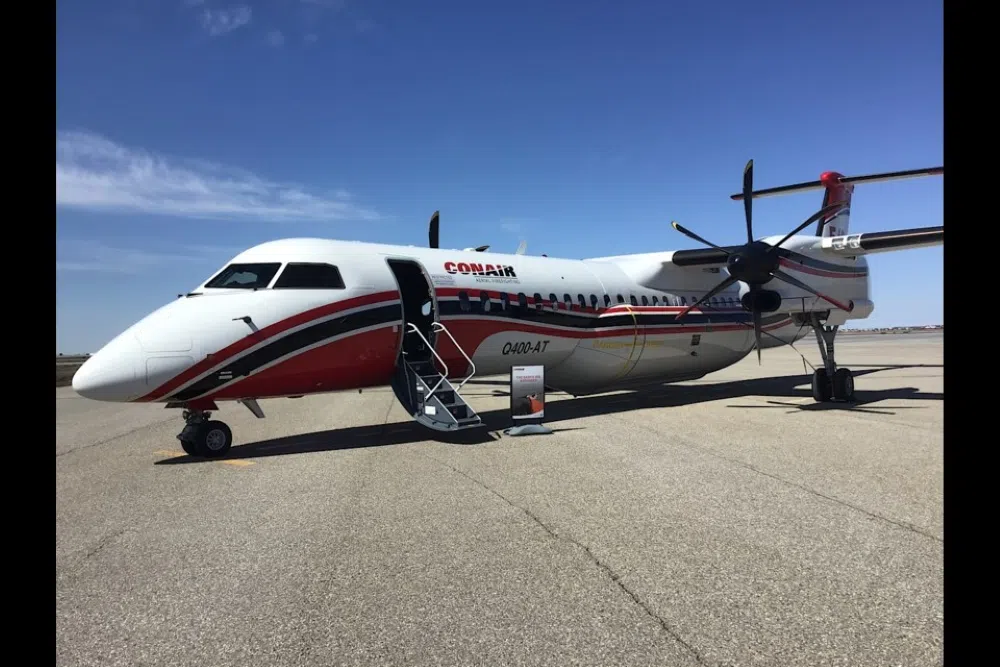The province and the Saskatchewan Public Safety Agency provided a sneak peek at the type of land-based tanker aircraft coming to their fleet in the coming years.
At an event at the Regina airport, details were released on four re-purposed land-based airtanker aircraft that will start joining the fleet in 2025 through the end of 2027. They are two Dash 8-Q400AT aircraft and two Dash 8-Q400MRE aircraft.

The aircraft will ultimately replace the current fleet of four Convair 580 airtanker airplanes, which are nearing the end of their useful life in 2027.
Those at the event Monday got a look at one such aircraft: one of the Q400AT belonging to Conair Aerial Firefighting, the company which will convert the four aircraft into airtankers and then deliver them to the province.
“I can tell you that the government is Saskatchewan is showing visionary leadership in their decision to modernize the air tanker fleet,” said Conair Aerial Firefighting President and CEO Matt Bradley. He called the Q400s the “most modern and the most versatile emergency response aircraft available in the world today.”
The Q400s are built entirely in Canada, with officials pointing out De Havilland Canada built the airliner, Pratt and Whitney Canada provided the engines, and Conair responsible for converting the airliner into an emergency response aircraft.
“Saskatchewan is the first province to invest in the safety and security of their citizens with a purchase of the multi-role airtankers, built by Canadians for Canadians. With this purchase Saskatchewan leads Canada in preparing for future disasters. That’s significant.”
The new planes are similar to the Q400s used as commercial aircraft for airlines such as WestJet Encore, but there are differences. The two Dash 8-Q400ATs are dedicated air tankers, while the Dash 8-Q400MRE can be reconfigured to serve multiple functions such as medical evacuations, transporting patients, or hauling cargo. The planes can seat upwards of 64 people for evacuations, upwards of 9,000 kg of cargo, and accommodate six stretchers.
Each aircraft is capable of providing fire suppression functions similar to the current fleet, including able to apply water and fire retardant from up above to wildfires. Corrections, Policing and Public Safety Minister Paul Merriman described the tank capacity for the new planes as 10,000 litres, or 25 more than the current fleet’s capacity. The new planes can travel at 660 km an hour or 35 percent faster than the current fleet’s ability. The new planes are also touted as producing 30 per cent fewer emissions than similar sized airtankers.
“Simply put, the Q400 tanker is faster and more efficient,” said Merriman.
Saskatchewan Public Safety Agency is purchasing the four planes at an approximate cost of $187.06 million, an investment that was announced in this year’s budget. This year, the province is making an investment of $5.5 million dollars, which is the deposit into this new fleet, with an additional three year payment plan to follow.
The planes are needed so SPSA can be better able to fight wildfires in the province well into the future. The province has seen dry and hot conditions and numerous wildfire situations in recent years.
Premier Scott Moe said this investment will allow responders to “better protect lives, better protect our communities, as well as major infrastructure and other valuables scattered across the province.”
“Every year Saskatchewan faces hundreds of wildfires stemming from both natural as well as human causes,” said Premier Moe, who noted there were five active wildfires in the province at the moment.
“In 2023 we had just over 500 wildfires in the province, and we may face similar challenges this year. We’re thankful for the moisture that we had this past week and hopeful some more will fall shortly. Not everyone that live in Saskatchewan may see a wildfire, but many, many feel the effects of those years where we have significant wildfires with smoke which ultimately blows south into our communities. Wildfires are a serious threat to public safety, especially in communities and people that live in our northern rural and remote communities.”
Moe called this an investment that is “not about this summer or next summer, but it’s about the longer-term next number of decades in keeping our community safer.”


